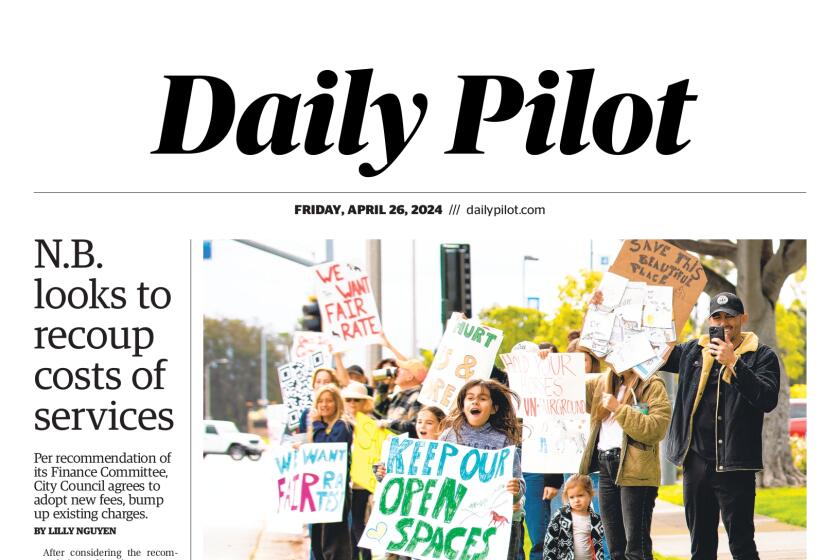Settlement gives Costa Mesa right to match any offer to buy New Harbor Inn
A legal ceasefire between the city of Costa Mesa and the New Harbor Inn gives the city the opportunity to buy the motel should the owners look to sell.
The settlement agreement, in which the two sides will dismiss cases against each other, also outlines several security, record-keeping, code enforcement and other procedures that have to be followed at the motel at 2205 Harbor Blvd.
The pact, a copy of which was obtained by the Daily Pilot on Friday, was unanimously approved by the City Council on Tuesday. It spells the end of more than a year of legal wrangling over the 32-room motel, with Costa Mesa agreeing to drop a public-nuisance complaint and owners Ming Cheng Chen and Hsiang Chu Shih Chen ending a federal lawsuit alleging the city had discriminated against them and their tenants.
Councilman John Stephens said Friday that the agreement was reached through “bilateral, good-faith negotiation” and addresses “pretty much every concern the City Council had.”
He said the result “is actually better than anything we were likely to get at trial.”
“The agreement has some serious teeth in the sense that if there’s a violation, the city has the opportunity to make a motion to the court to obtain a judgment to enforce its terms on an expedited basis,” he said.
Attorney Frank Weiser, representing the Chens, also praised the agreement, saying it affirms his clients’ rights while providing better-defined procedures for them and the city to follow.
“The city is also required to meet constitutional standards,” he said Friday. “So if there is a dispute, it’s a two-way street and the Chens can then hold the city in default.”
The settlement includes a stipulation that the city has a non-transferrable “right of first refusal” should the Chens look to sell the motel.
The city would have up to 30 days to match the terms and conditions of any written purchase offer. If it does, the city’s offer would take priority.
Weiser said that as far as he is aware, “the Chens are not interested in selling at this time.”
However, should they “get a good price for the motel, they don’t have a problem offering it to the city,” he said.
Under the settlement, the Chens agreed to retain a licensed security company to patrol common areas of the motel four times a day between 6 p.m. and 6 a.m.
Additionally, the current motel manager — who is a licensed security guard — will patrol at least twice between 6 a.m. and 6 p.m.
Should the manager depart, the Chens agreed to either hire a replacement who is a licensed security guard or retain a licensed company to make the required patrols.
Weiser said security patrols already are conducted at the motel.
“It may be a little bit different in terms of the hours the city was more comfortable with, but they [the Chens] already had taken proactive steps themselves in doing that awhile back,” he said.
The Chens also will keep guest registration cards and copies of guests’ photo identification on file for at least 90 days. During that period, the city would have the right to make a written request for that information, which the Chens would have to provide within seven days.
Documentation also will be kept on security patrols and housekeeping services at the motel. That information also must be retained for at least 90 days and must be available to the city within 14 days upon written request.
Weiser said his clients appreciate that there’s now a process in place for the city to access that information.
“The Chens want to comply, they want to be able to give the city information, but it’s subject to due process standards, Fourth Amendment standards,” he said.
The city will be allowed to conduct a code enforcement inspection of the premises — including guest rooms — at a mutually agreed date and time “to determine that the motel is being operated in compliance with applicable state and local law,” according to the settlement.
Code enforcement officers also will be able to enter public areas of the motel when police and/or fire personnel are responding to calls for service at the property.
The city agreed to give 24 hours notice of code enforcement inspections of occupied motel rooms.
“Further, the city will be responsible for directly contacting such occupants and guests to obtain any necessary consent prior to inspections,” the agreement states.
Both parties pledged to comply with all local, state and federal laws, rules and regulations as they pertain to the motel’s operation.
Stephens said the agreement could be used “as a model to address issues that might come up with other motels.”
“The gist of the [city’s complaint] and the gist of the settlement agreement was to make the community safer — in particular by making this property, this business, a safer place,” he said. “We now have a mechanism to do so that we didn’t have before. It’s a very positive development.”
Twitter @LukeMMoney
All the latest on Orange County from Orange County.
Get our free TimesOC newsletter.
You may occasionally receive promotional content from the Daily Pilot.




